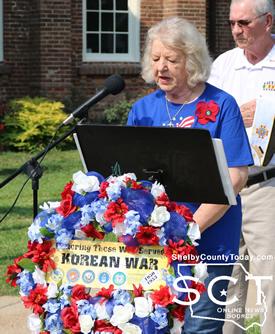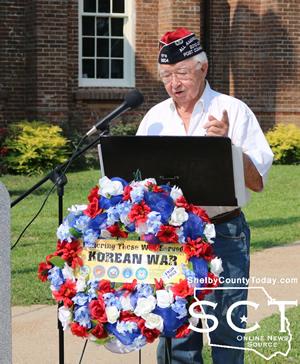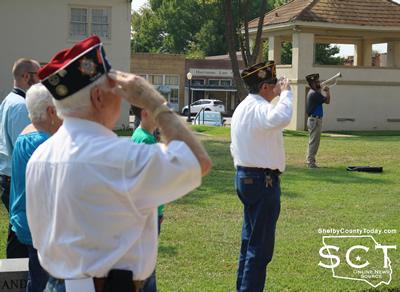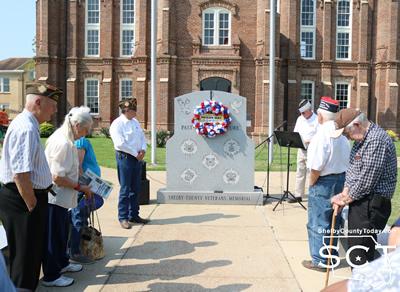
 August 9, 2018 - VFW Post 8904 recognized the Korean War Armistice 65th anniversary on Friday, July 27, 2018 at 10am. Opening prayer was led by Auxiliary President, Sandy Risinger.
August 9, 2018 - VFW Post 8904 recognized the Korean War Armistice 65th anniversary on Friday, July 27, 2018 at 10am. Opening prayer was led by Auxiliary President, Sandy Risinger.
Larry Hume welcomed everyone, "Thank you for joining us this sunny morning to remember the 65th signing of the peace armistice which ended the Korean War which lasted from June 25, 1950 to July 27 1953. Sixty-five years ago today the war ended and hundreds of thousands of Americans served their country during that war and many gave their lives. Some called the Korean War the forgotten war but those Americans who served during that time will never be forgotten by the Veterans of Foreign Wars and the Auxiliary. These men served with honor and distinction. Some call it a Korean Conflict, it was not a conflict. A conflict is something you have with your children. It was a war with 33,686 battle deaths; 2,830 non-battle deaths 103,000 wounded in action. Still missing from the Korean War 7,699 Americans. That number missing-in-action is 41 less than last year. Thanks to the Defense POW/MIA accounting agency 41 more families have closure. And with the new climate in North Korea that number is even less. The first 55 landed in Osan Airbase this morning and their remains will be taken to forensic laboratory in Hickman Air Force base in Hawaii for identification. We have one MIA who might be one of that group.
 "This morning, our Past Post Commander John Piersol served in Korea in the United States Army during that time. He was a paratrooper earning the Korean Service Medal with five bronze service stars, United Nation Service Medal, Meritorious Unit Citation, Army of Occupation, the Korean Presidential Unit Citation, Coveted Combat Infantryman Badge, and Parachute Badge. I have asked John if he would like to recount some of his memories this morning."
"This morning, our Past Post Commander John Piersol served in Korea in the United States Army during that time. He was a paratrooper earning the Korean Service Medal with five bronze service stars, United Nation Service Medal, Meritorious Unit Citation, Army of Occupation, the Korean Presidential Unit Citation, Coveted Combat Infantryman Badge, and Parachute Badge. I have asked John if he would like to recount some of his memories this morning."
Piersol spoke honoring those he served with, "I have been given the opportunity to speak about the Korean War and the men and women that gave their life during the 4-year campaign in Korea. This is celebrated on this day by Mr. and Mrs. America and all the ships at sea which is a statement an old-time newscaster used to say on the radio. These are my opinions but I tried to remember some of the things that are often not heard of and little humor and insight of these stories."
"I was a draftee, that tells you something right there. I figured if I was going to be in the army I might as well be a good soldier so I volunteered for the airborne school. Next stop was Japan. While in Japan I was assigned to a military company that was attached to the 182nd Airborne and Regimental combat team. Now when I was a real young man and the second World War ended, I remembered seeing movies about GIs in Europe and around that always made the pack of cigarettes an important item. They would trade them for information from the enemy, for food, and sometimes trade them for girlfriends.
"So, when I was going into Korea I figured I would work on a package of cigarettes. When I got there, the cigarettes were not the important thing. The important thing, of all things, was a roll of toilet paper. In 1950, Korea did not know what a roll of toilet paper was, which I thought was very interesting. Another enlightening and funny thing that happened, on my first jump in Korea in 1950, we were to go in and try to locate a mass of American prisoners that was around 250 - 400 miles north of the 38 parallel. Our job was to locate these men and see what we could do about freeing them. The problem was most of our equipment landed in rice paddies and we weren't able to use it or get it out of some of the rice paddies. I remember the job master walking up and down the stick making sure we were hooked up right. And one of his statements were 'Well, boys, we are in for 30 days of rough combat.' One of the troopers said, 'that's easy, Master, I got that right here.' Then the Master said, 'Have you got nights right there?' to which meant we weren't thinking ahead too good, I guess.
"We were the last combat jump to be made without the use of helicopters. In Korea, helicopters were used for the wounded and for observation. They didn't carry many troops or land troops into combat areas. Another fact, the men coming back from the middle east that talked to me about Korea and their war, I asked what the difference was and the main thing that I observed that would scare me to death, if I was in the middle east today, in Korea you had no problem identifying the enemy. They all wore quilted uniforms and they all looked the same. You knew who the enemy was. In the middle east, I guess you would have to kill them all and God pick the goods ones out as there is no way to tell who the enemy is in my opinion."
"The biggest problem our troops had outside of combat was frozen feet. We wore leather shoes, leather boots, thick socks which caused your feet to sweat. When you got cold in the foxhole, your feet froze and you were no longer a combat issue. The North Korean, this was an issue that demoralized a lot of people, they wore tennis shoes, not socks, and all they had on were these quilted uniforms. Their feet didn't freeze because they didn't produce any sweat to cause your feet to freeze. Another fact I hate to bring up is the measure of the incentive of the war. There were more people killed, troops killed in four years than there were in 12 years in Vietnam. I thought that was a very interesting fact. At this point, I would like to read our list of the men and women who served in the Korean War and didn't make it back home. It is pleasure and honor for me to be able to read these names.
"Floyd Harris killed in action in Sept 1950; Clifford Hughes killed in action August 1950; Johnny V. Mena killed in action April 1951; Bobbie F. Mock killed in action November 1950; Billy Clyde Stephenson killed in action November 1952; Leonard Williams killed in action May 1951; Willie Wilson killed in action May 1951; Willie E. Windham missing in action since August 12, 1950; known prisoners of war are Herbert L. Langford, North Korean prisoner of war, Pearl D. Lucas, North Korean prisoner of war, and Billy Westcoat, Chinese prisoner of war. I thank ya'll for indulging me and if you have any questions I will be happy to answer them. Thank you very much."
Larry Hume said, "The one missing-in-action, Willie Windham, is the one I referred to when I said it would be nice if he was among the 55 that they brought home this morning. One other interesting note, Clifford Hughes, who was killed-in-action also served in WWII and won the Silver Star and came out unscathed, then went back in the Korean War and was killed-in-action. We can never thank those who served during that time enough. John, we thank you."
John Piersol then had the honor of placing the memorial wreath on the Veterans monument and the ceremony was closed by the playing of Taps by Post Junior Vice Jason Samford.










